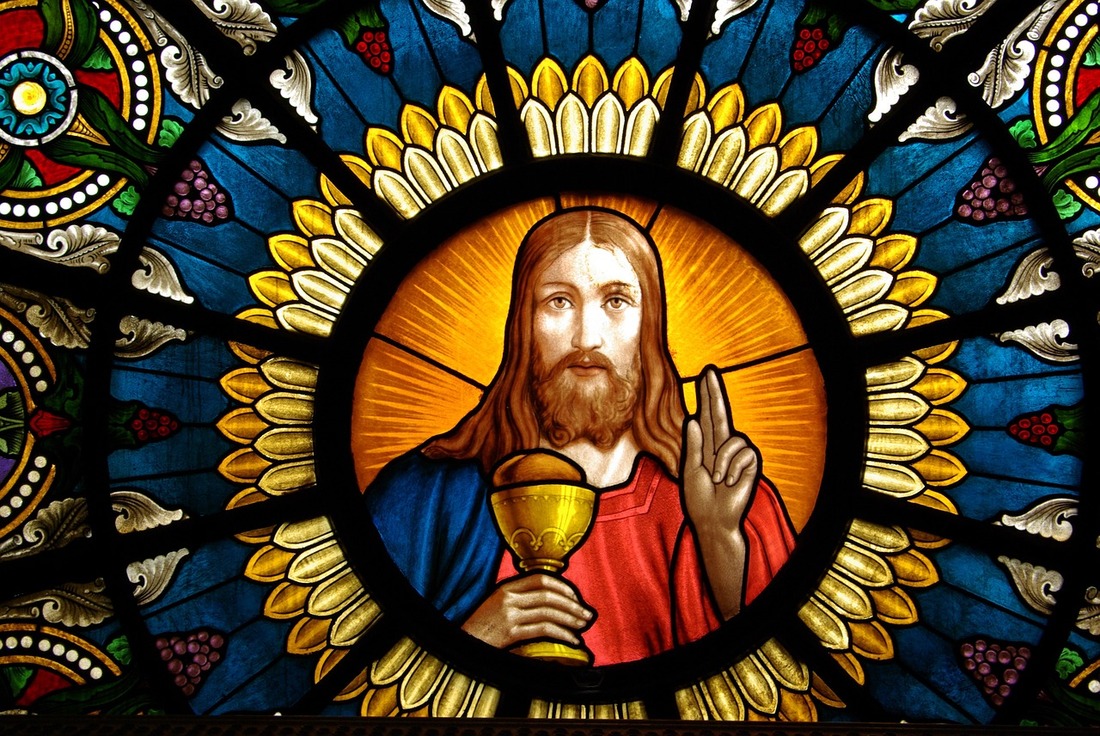|
I had the privilege of delivering the message at St. David of Wales today. The gospel reading was Luke 23:33-43.
Today’s gospel passage smacks us right into the middle of Christ’s crucifixion without any lead up. It’s a difficult passage to read and sit with and we encounter it today as we observe the Feast of Christ the King marking the end of our Christian liturgical year as we turn from the long season of Ordinary Time following Pentecost and prepare to enter into Advent next Sunday. It seems like the perfect bridge after these months of following Jesus’ through his earthly ministry to remember his suffering and ultimate triumph before we turn to a time of waiting for Christ’s arrival. Thirty years ago, I joined the worship committee at my United Methodist Church. I’d been a Christian for a few years by then, and had taught Sunday school for first and second graders from a pre-printed curriculum but until I began planning worship, I really had no idea how the scriptures for a given Sunday were chosen. I soon learned that Methodists follow the Revised Common Lectionary, a three-year cycle of readings that provide a broad overview of Biblical texts from the Old and New testaments. Episcopalians follow this lectionary as well, and both denominations observe the major seasons and holy days in the liturgical year such as Advent, Christmas, Epiphany, Ash Wednesday, Lent, Good Friday, Easter, Pentecost, and All Saints Day. Now I vaguely recall the Sunday before Advent being named Christ the King Sunday as a Methodist, but we don’t observe a number of holy days, particularly those honoring saints, that are familiar to Catholics and Episcopalians, and I hadn’t given much thought to how the observances of these feast days came about. I assumed, that like the major holy days, these observances had been around for hundreds, if not thousands of years, that they came to us from our Jewish roots, or the time of the early church, or the Reformation. So, I was surprised to discover that the Feast of Our Lord Jesus Christ the King was instituted by Pope Pius the XI in 1925 and was originally observed on the last Sunday of October. In 1969 Pope John Paul the VI changed the title of the observance to “Our Lord Jesus Christ, King of the Universe,” and moved the date to the final Sunday of the liturgical year. Pius XI was pope during the final stages of the merger of formerly independent states in the Italian Peninsula into a United Kingdom of Italy, and he brokered an agreement in 1929 to settle the “Roman Question” that brought most of the original papal states under Italian rule, but preserved the Pope and Catholic church’s right to govern Vatican City. He established the Feast of Christ the King in an encyclical—a letter circulated among the churches—titled Quas Primas in December 1925. He wrote in the aftermath of World War I, and in response to growing secularism and nationalism, reminding the faithful of who their true ruler was. It had never occurred to me that our liturgical observances are not static dates on a calendar, varying only with the cycles of the moon, but that they, too are evolving, influenced by the work of the Holy Spirit and, in this case, in response to political and cultural disintegration that threatened not just the church, but who and what the church ought to worship. When secularism becomes freedom from religion, rather than of religion, when we discount the great mysteries of creation, we make humans gods and our concerns narrow as individuals pursue their desires devoid of concern of a power beyond our own understanding. We become slaves to systems that prize rules, regulations, and profit to the exclusion a spiritual life, compassion for the lost and the least, and reverent care for the environment that sustains all life. It is natural to identify with groups we belong to—they provide us with identity, safety, and community, but nationalism can warp our natural support of and affiliations with family, tribe, city, state, and country, when we come to believe that our way as the only way, that what we think and do is always aligned with truth. Engulfed in nationalism we become unable to look at our actions and policies critically, to see our own faults, and flaws. We become distrustful of people and places outside our own circles and experience, and devalue differences between us. Left unchecked nationalism leads to violence and war, to fear of the other, to the demonization of ethnic groups, immigrants, and refugees, to the belief that we are somehow more human and worthy than others, and that the needs and wants of our group are paramount over any larger common good. We lose sight of our interconnectedness, and our dependence upon God and one another. Today, perhaps even more so than the ninety-four years ago, we need this feast day, this reminder that our ultimate allegiance lies with family, country, or even our particular religion, but with Christ, the King of the Universe. A king who refused to call himself such. A king who sacrificed his own welfare and life on behalf of others. A king who constantly challenged the authorities on behalf of the poor and oppressed. A king we encounter on the cross in today’s gospel reading, who as he was being put to death, refused to defend himself as he was mocked by religious leaders, the soldiers who functioned as police, the crowd of onlookers, and even a criminal hanging on his own cross. In his encyclical Pius XI wrote this about Christ: So he is said to reign "in the hearts of men," both by reason of the keenness of his intellect and the extent of his knowledge, and also because he is very truth, and it is from him that truth must be obediently received by all mankind. He reigns, too, in the wills of men, for in him the human will was perfectly and entirely obedient to the Holy Will of God, and further by his grace and inspiration he so subjects our free-will as to incite us to the most noble endeavors. He is King of hearts, too, by reason of his "charity which exceedeth all knowledge…” If we are indeed subjects of Christ the King, if he is to reign over our wills and hearts, then we are commanded to emulate his manner of ruling over us. To set aside our ego, and pride, our need to be right, and to give up beliefs and behaviors that separate us from the love and will of God. We are asked to offer and receive forgiveness, to humble ourselves, to care for the widowed, the orphans, the mentally ill, the prisoners, the disabled, the refugees, the immigrants, and those who do not look or act or worship like us. But like Jesus’ disciples, we will not be able to do all that we are asked. Like Peter we will deny Christ; like his friends we will cower behind locked doors even though we love him and want to do what he asks. Despite our betrayals, Christ our King behaves like no other ruler. He does not exact revenge or retribution for our failures. He does not jail or banish, or ex-communicate us. “Father, forgive them; for they do not know what they are doing,” he says from the cross and in our midst today. “Truly I tell you, today you will be with me in Paradise,” he says in the last minutes of his life, inviting everyone into the kingdom of heaven. “If you are the king, save yourself!” those who mock him cry. But he does not. He saves us instead. … I close with this poem written by United Methodist pastor and poet, Steve Garnaas-Holmes: Suffering Sovereign Condemned, scorned and disposed of, whose life does not matter, enthroned under the weight of a cross, crowned with pain and humiliation, holding a scepter of powerlessness: the little man is a sad excuse for a king. That is, if you seek an unmoved mover, removed, impervious, who will excuse you from life, enabling you to be likewise. You can have him. Give me the one whose sovereignty is to rule in all suffering, to bless all pain by occupying it, to shine the light of love from inside the darkest night, whom nothing can prevent walking with us in our gravest trials. Give me royalty under whose reign every abuse and injustice, even toward the least honorable, is treason; whose decree, even from within our public agony and secret prison cells, is paradise. You can have your mighty warrior. Give me the little man with holes in his hands whose heart is never far from mine, whose imperial reign is right where I am. __________________ Steve Garnaas-Holmes Unfolding Light www.unfoldinglight.net
0 Comments
Your comment will be posted after it is approved.
Leave a Reply. |
I began blogging about "This or Something Better" in 2011 when my husband and I were discerning what came next in our lives, which turned out to be relocating to Puget Sound from our Native California. My older posts can be found here.
Categories
All
Archives
September 2023
Newsletters |

